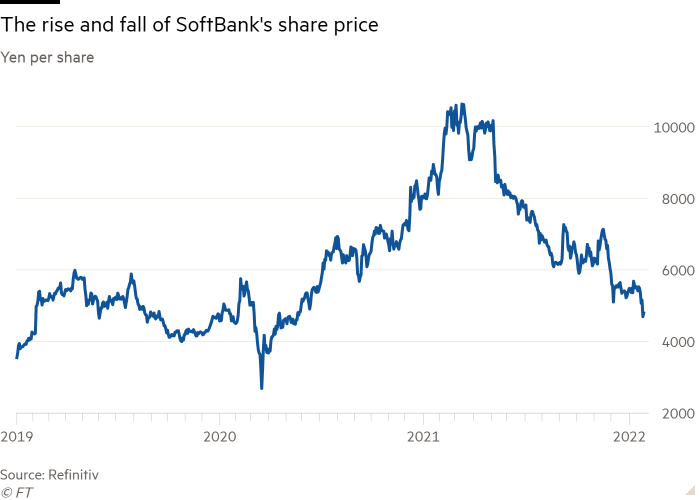For nearly a decade, whenever a SoftBank investment turned sour, Masayoshi Son would call upon his in-house fixer Marcelo Claure to solve the hitch.
It was Claure’s belief in his record of company turnrounds that led to a demand of at least $1bn in compensation last year, people with knowledge of the interaction said.
The battle over that payout — which Son thought was informal scribbling on a sheet of paper, but Claure believed constituted a written agreement — was at the heart of the conflict between the two billionaires.
It has forced the founder of SoftBank to solve the problem of Claure, a Bolivian entrepreneur who helped the Japanese conglomerate turn round multiple ailing businesses, most recently at office-sharing group WeWork.
After months of tense negotiations and years of grumbling over his pay, Claure has quit the group with an exit package worth hundreds of millions of dollars.
People with knowledge of the terms told the Financial Times, Claure will receive a severance payment between $30m-$40m and will continue to have a stake in SoftBank’s Latin America fund, that depending on its performance, could be worth between $200m and $400m.
Claure has also agreed to a non-compete clause, meaning he cannot start certain projects that compete against SoftBank for “a couple of years” or poach staff during that time. One of the people added that he had freedom to start other new ventures without elaborating. SoftBank and a spokesperson for Claure declined to comment.
This account of Claure’s rise — and his eventual falling out with Son — is based on several people with direct knowledge of the events.
His exit is only the latest in a series of businessmen with big personalities recruited into the group by Son, only to depart after falling out with the Japanese billionaire over the future of the company he singularly controls.
His departure revives a longstanding concerns about the unruly company’s direction under Son at a moment of vulnerability.
A sell-off in growth-orientated technology stocks worldwide and a crackdown on Chinese start-ups by Beijing has ravaged its portfolio of holdings. Since hitting an all-time high in March last year, shares in SoftBank have tanked 60 per cent. Its plans to offload UK chip designer Arm to Nvidia of the US look set to collapse.
Claure’s eight year tenure at SoftBank will be best remembered for his role in leading struggling US telecom operator Sprint into an all-share merger with its larger rival T-Mobile, which is controlled by Deutsche Telekom.
Son parachuted Claure into Sprint as its chief executive in 2014 following SoftBank’s $22bn acquisition. He guided the subsequent merger with T-Mobile to completion in 2020, navigating two difficult years of antitrust challenges.
The deal was a considerable achievement: a consolidation of the multibillion-dollar US mobile market into just three dominant operators. It also unlocked huge returns for SoftBank just as it was under pressure to offload assets during the early months of the pandemic.
The Sprint merger also showed how top SoftBank executives have enhanced their wealth from involvement in deals they worked on.
Claure was already one of the highest paid executives by a Japanese company, collecting $19m and $15m in pay in respectively the financial year ending in March 2020 and over the first eight months of the following financial year.
More lucrative was the $500m in T-Mobile shares that Claure bought as part of a complicated transaction that allowed SoftBank to cash-in on its holdings. He made the purchase thanks to loans from SoftBank itself.
It was not the only time that SoftBank provided gigantic loans to Claure to bet on stocks. Four executives, including Claure and Rajeev Misra, had previously received around $600m in loans in total from SoftBank to aggressively bet on its shares.
But along with SoftBank, shares in T-Mobile have tumbled sharply since hitting their highest levels in 2021 meaning most if not all returns from those bets have been wiped out.
One close observer of the company said the decline in Claure’s investments was akin to “a triple whammy” when coupled with hits to the performance of SoftBank’s two private investment funds following the tech sell-off.
Claure first caught the attention of SoftBank in 2013 when the group bought a majority stake in his Miami-based telecoms start-up Brightstar for $1.26bn, subsequently bringing Claure inside the Japanese conglomerate. The Brightstar deal turned Claure into a paper billionaire and one of the richest Latinos living in the US.
In Miami, Claure is known for rubbing shoulders with celebrities, including Jennifer Lopez, who performed at his 40th birthday party, and David Beckham, with whom he launched Major League Soccer team Inter Miami — an ill-fated investment in which Son also participated.
Claure’s gregarious personality and knack for problem-solving helped him climb inside SoftBank’s hierarchy, eventually moving into an inner-circle of top executives with significant influence within Son’s group.
But he has clashed with Misra, a former Deutsche Bank trader who runs SoftBank’s private investment unit arm including its two Vision Funds.
Claure was named chief operating officer of SoftBank, soon after the Sprint deal with T-Mobile was agreed, in May 2018, after convincing Son that he could build a team of operators who would go around and help companies within the group’s portfolio.
He relocated his family to Tokyo, recruited a team of dozens of professionals and began looking more closely at operations of Vision Fund-backed companies. But his authority was quickly undermined by Misra, who launched a turf war and eventually took control of the team Claure had built.
Claure left Tokyo after just a short stint, returned to the US and launched a Latin America focused-fund in March 2019, attempting to use his regional network and carve out his own influence within SoftBank outside of Misra’s reach.
Later, he was tasked by Son to rescue WeWork following the office rental company’s disastrous failed initial public offering and removal of chief executive and co-founder Adam Neumann.
WeWork finally went public last year through a Spac merger that valued the business at $9bn, far less than the $47bn it originally hoped to achieve under Neumann.
As SoftBank’s own shares plunged in 2020, and faced increased pressure from activist investor Elliott Management, Claure was among a team of senior figures tasked with leading the effort to raise funds to pay for a share buyback and debt reduction. That included striking a cash-and-stock deal to sell UK-based chip designer Arm to Nvidia.
The pair’s relationship has soured over the past year over Claure’s demands for compensation, his private investments and the group’s strategic direction — a point of contention among SoftBank investors and executives.
Claure, the group’s chief operating officer, has negotiated an exit package that partly reflects his stakes in multiple companies in which he personally co-invested alongside SoftBank’s technology and Latin America focused funds.
That expensive departure leaves Son seeking a new problem solver and right-hand man.
Additional reporting by Miles Kruppa in San Francisco











